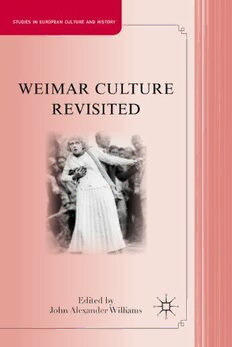
Weimar Culture Revisited PDF
263 Pages·2011·3.631 MB·English
Most books are stored in the elastic cloud where traffic is expensive. For this reason, we have a limit on daily download.
Preview Weimar Culture Revisited
Description:
For decades after the Second World War, historians and writers depicted cultural life in Germany’s Weimar Republic (1919-1933) as an unstable mixture of avant-garde experimentation, decadence, and proto-fascist tendencies. Their limited definition of “culture” as a canon of works by elites hindered the study of everyday cultural forms. A younger generation of scholars now takes the broad view of culture as not merely the work of elite artists and intellectuals, but as constructed in everyday practice and thorough popular participation. This is the first book to offer an accessible cross-section of these “new cultural history” approaches to the Weimar Republic. The essays in this volume recover the everyday by focusing on visual and political culture, transnational currents in the mass media, and the intense popular interest in sports, health, and nature. Weimar Culture Revisited attests to the extraordinarily multi-faceted nature of democracy in interwar Germany.
See more
The list of books you might like
Most books are stored in the elastic cloud where traffic is expensive. For this reason, we have a limit on daily download.
